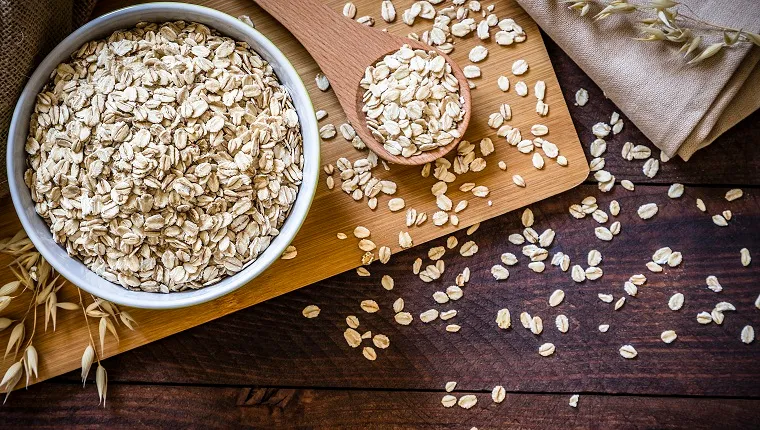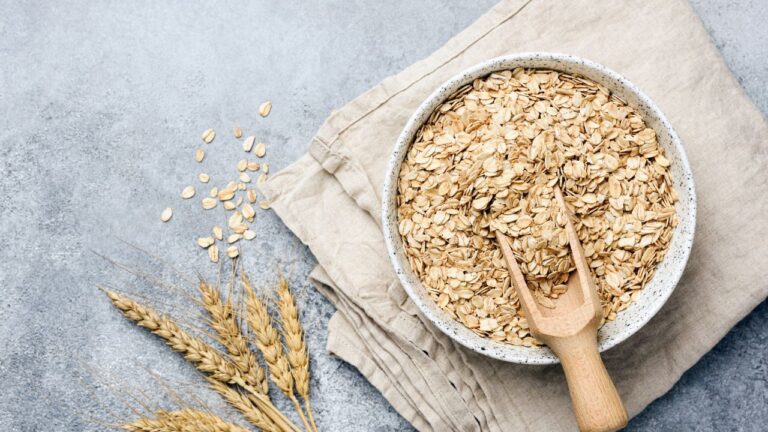There is no scientific evidence to suggest that eating oats directly causes an increase in the size of your buttocks or any targeted area of your body. Oats are nutritious whole grains containing fiber, vitamins, and minerals that can contribute to a healthy diet, but they do not have a direct impact on the size or shape of specific body parts.
Body size, including the size of your buttocks, is influenced by various factors such as genetics, overall diet, exercise regimen, and lifestyle habits. If you’re aiming to enhance the shape or size of your buttocks, targeted exercises like squats, lunges, and glute bridges, along with a balanced diet and overall fitness routine, may help strengthen and tone those muscles.
What Constitutes Oats’ Nutritional Composition and Effects on the Body?
Oats are a highly nutritious whole grain known for their health benefits. They are rich in various nutrients and provide several positive effects on the body. Here’s an overview of oats’ nutritional composition and their effects on health:
Nutritional Composition of Oats

Carbohydrates
Oats are primarily composed of carbohydrates, mainly in the form of dietary fiber and complex carbohydrates. They provide a sustained release of energy.
Fiber
Oats are an excellent source of both soluble and insoluble fiber. Beta-glucan, a soluble fiber present in oats, has been associated with numerous health benefits, including improved heart health and blood sugar regulation.
Proteins
Oats contain higher protein content compared to other grains. They provide essential amino acids necessary for various bodily functions.
Fats
Oats contain healthy fats, including polyunsaturated and monounsaturated fats, which contribute to heart health.
Vitamins and Minerals
Oats contain various vitamins and minerals such as manganese, phosphorus, magnesium, iron, zinc, folate (vitamin B9), and B vitamins like thiamine and pantothenic acid.
Antioxidants
Oats contain antioxidants like avenanthramides, which have anti-inflammatory and protective properties.
Effects on the Body
Heart Health
The beta-glucan in oats helps reduce cholesterol levels, particularly LDL (“bad”) cholesterol, thereby supporting heart health. It may also help lower blood pressure and reduce the risk of heart disease.
Blood Sugar Control
Oats have a low glycemic index, meaning they have a minimal impact on blood sugar levels. The soluble fiber in oats helps regulate blood sugar by slowing down digestion and the absorption of carbohydrates.
Digestive Health
The fiber in oats supports healthy digestion by promoting regular bowel movements and preventing constipation. It also contributes to a healthy gut microbiome.
Weight Management
Oats’ fiber content can contribute to a feeling of fullness, potentially aiding in weight management by reducing overall calorie intake.
Antioxidant and Anti-inflammatory Properties
The antioxidants in oats, particularly avenanthramides, have anti-inflammatory and antioxidant effects, which may help reduce inflammation in the body and protect against certain diseases.
Improved Skin Health
Some studies suggest that oats, when used topically or consumed, may have benefits for skin health due to their anti-inflammatory properties.
Athletic Performance
Oats are often consumed by athletes as they provide a good source of energy, protein, and nutrients, aiding in sustained energy levels and muscle recovery.
How Do Genetics, Exercise, and Diet Influence Bum Size?

The size and shape of an individual’s buttocks (bum) are influenced by a combination of genetics, exercise, and diet. Here’s an overview of how each of these factors can impact bum size.
Genetics
Genetics play a significant role in determining body shape, including the size and distribution of fat in various areas, including the buttocks. Some people may have a genetic predisposition to store more fat in the buttocks area, leading to a naturally larger or more prominent bum.
Genetic factors also influence muscle development. The shape and structure of the gluteal muscles (the muscles of the buttocks, including the gluteus maximus, gluteus medius, and gluteus minimus) are determined by genetics. Some individuals may have genetically more developed or pronounced gluteal muscles, contributing to a fuller or more sculpted appearance of the bum.
Exercise
Regular exercise, especially targeted strength training and specific exercises, can have a significant impact on the size, firmness, and shape of the buttocks:
Exercises that target the gluteal muscles can help build muscle mass and enhance the shape of the buttocks. Examples include squats, lunges, deadlifts, hip thrusts, glute bridges, and leg presses. These exercises can increase muscle size and definition in the buttocks region.
While cardio exercises like running, cycling, or aerobics might not directly build glute muscles, they can help reduce overall body fat, potentially revealing a more defined and toned bum.
Diet
Diet plays a role in overall body composition, including fat distribution. While you can’t specifically target fat loss in one area, maintaining a healthy diet can contribute to overall body fat reduction, which may impact bum size. A well-balanced diet that includes:
Protein is crucial for muscle growth and repair, including the muscles in the buttocks. Sources of protein like lean meats, legumes, dairy, and plant-based proteins can support muscle development.
Consuming healthy fats in moderation, such as those found in avocados, nuts, seeds, and fatty fish, can help maintain hormonal balance and overall health.
Managing calorie intake to match individual goals, whether it’s weight loss, maintenance, or muscle gain, can influence overall body fat levels, potentially affecting the appearance of the buttocks.
Overall Lifestyle
Factors beyond genetics, exercise, and diet can also impact bum size. These include lifestyle factors like overall body weight, posture, hormonal balance, and age.
FAQ’s
Do oats get bigger?
Oats can expand when cooked or soaked in liquid due to absorbing water, making them appear larger in size.
Do oats make one thick?
Oats are a source of dietary fiber, which can contribute to a feeling of fullness, but they don’t directly cause physical thickness.
Can I eat oatmeal 3 times a day and lose weight?
Consuming oatmeal multiple times a day alone isn’t a guaranteed method for weight loss; a balanced diet and calorie control are essential.
Why do oats get thick?
Oats thicken when cooked due to the starches they contain, which absorb water and swell, resulting in a thicker consistency.
Is oatmeal better thick or thin?
The thickness of oatmeal is a personal preference; both thick and thin consistencies offer the same nutritional benefits.
Can I eat oats with water?
Yes, oats can be prepared with water, and it’s a common method for cooking them, though using milk or milk alternatives can enhance flavor and creaminess.
Final Words
In the pursuit of a fuller or shapelier bum, the notion that oats directly contribute to buttock growth lacks scientific support. Oats, while a nutritious whole grain, don’t singularly affect targeted body parts. Rather, genetics, exercise, diet, and lifestyle collectively influence buttock size and shape. Oats offer multiple health benefits, from heart health to skin benefits, yet their consumption alone doesn’t sculpt one’s physique.
Effective exercises like squats and lunges, coupled with a balanced diet and fitness regimen, aid in toning and strengthening gluteal muscles. Understanding the holistic interplay of genetics, exercise, and diet is key in achieving personal body goals beyond the realm of any single food item.

